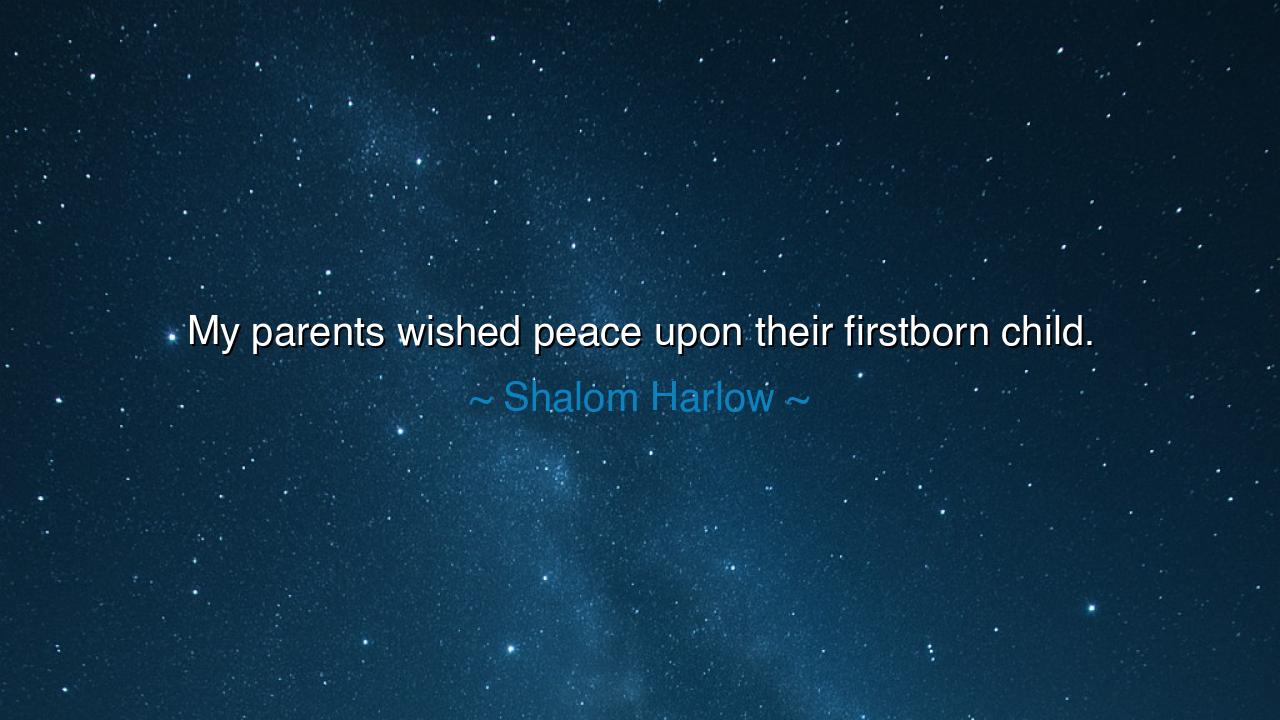
My parents wished peace upon their firstborn child.






Hear the words of Shalom Harlow, spoken with simplicity yet carrying the depth of ancient blessing: “My parents wished peace upon their firstborn child.” This utterance is not merely a statement of fact, but a glimpse into the eternal hope of parents across time. To bring life into the world is to plant a fragile seed in the soil of uncertainty. And so the greatest prayer of all mothers and fathers has always been that their children might walk in peace, shielded from the storms of conflict, and surrounded by the calm of harmony.
The meaning of this saying shines like a star. When parents wish peace for their firstborn, they confess the truth that worldly wealth or power are but shadows compared to the radiance of tranquility. To live in strife, even with riches, is misery. To live in peace, even with little, is abundance. Thus, in giving their blessing of peace, they give the highest gift they know, one that surpasses possessions and crowns the soul with serenity.
The origin of such blessings can be traced back through every culture and age. In the Hebrew tradition, the greeting shalom—meaning peace, wholeness, harmony—was spoken not only as a word of welcome, but as a prayer that one’s life might be filled with completeness. Among the ancients, the firstborn often bore the weight of inheritance, leadership, and responsibility. To wish peace upon them was to hope that they would not be crushed by burden, but would carry it with grace, surrounded by balance and blessing.
History bears witness to this yearning. Consider the life of Marcus Aurelius, emperor of Rome and philosopher. His writings in the Meditations reveal a man constantly striving for inner peace amidst the turmoil of ruling an empire. Though crowned with power and surrounded by legions, his deepest wish was the same as Harlow’s parents: to walk in harmony with himself and with others. His reflections show that even the mightiest crave what parents instinctively desire for their children—the gift of peace.
O children of tomorrow, understand this: the first wish spoken over a child is a compass for their life. When the wish is for peace, it plants in the heart a seed of gentleness and wisdom. It reminds the child, as they grow, that the highest calling is not conquest but harmony, not domination but compassion. For all the world’s victories are fleeting, but peace endures as the root of joy.
Reflect upon your own life. Did your parents wish peace for you? Do you, in turn, wish peace for those who come after you? Perhaps your life has been storm-tossed, perhaps you have walked through conflict and loss. Yet still, you may reclaim this blessing for yourself, and you may pass it onward. By choosing peace in your words, your actions, and your presence, you fulfill not only your parents’ wish but also humanity’s deepest prayer.
The lesson is clear: to wish peace is the highest blessing, and to live peace is the greatest fulfillment of that blessing. Let your prayer for your children, for your loved ones, and even for yourself, be always this: may peace dwell within, may peace guide your steps, may peace embrace your destiny.
So let Harlow’s words echo as a testament: “My parents wished peace upon their firstborn child.” May we all honor this ancient hope, both in receiving it with gratitude and in bestowing it with love, until peace becomes not only a wish but a living reality among us.






NDNguyen Dunz
Harlow’s quote about peace being wished upon her makes me think about the value of peace in our lives. Is peace something that can be gifted or something we have to create for ourselves? How much does a child’s sense of peace depend on the emotional environment created by their parents versus their own personal journey? Can true peace be cultivated, or is it more about navigating the chaos of life with resilience?
THThao Han
Shalom Harlow’s reflection on her parents’ wish for peace touches on a deeper sentiment: how parents' hopes shape their children's future. But what if peace isn’t just a wish, but something parents actively instill through their actions? How do parents model peace in their everyday lives? Can peace be taught in the way that love or discipline is, or is it more about a state of being that’s difficult to instill?
PLPhan Thi Phuong Linh
The idea that her parents wished peace upon Harlow as a firstborn child feels like a universal hope. But what about those who grow up in environments where peace is absent? Can children still find peace within themselves despite external chaos? How much of a role do parents have in fostering this inner peace, and how much is shaped by external circumstances and personal choices?
VBho van bay
Harlow’s quote about her parents wishing peace for their firstborn child is beautiful, but it raises the question: Is peace something we can actively give to our children, or is it more about the world around them? Can parents truly create an environment of peace, or is it more of a wish that can only be influenced by larger societal factors? What role do parents play in fostering peace, both in their homes and within their children’s hearts?
TTTruong Trieu
Shalom Harlow's reflection on her parents wishing peace upon her as their firstborn child seems so touching. It makes me wonder, though: What does it mean for parents to wish peace for their child? Is it simply a hope for a life free from conflict, or does it carry deeper, more personal meanings? How do parents’ wishes shape the future or the emotional environment in which a child grows up?